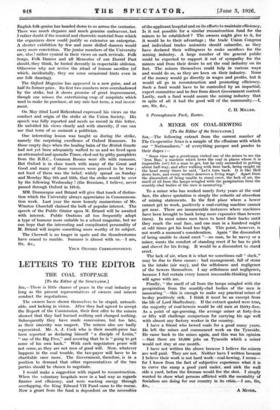A MINER ON COAL-HEWING [To the Editor of the SPECTATOR.]
SIR,—The following extract from the current number of
The Co-operative News is a sample of the effusions with which our " Nationalizers," of everything pamper and pander to their dupes :-
" Some time ago a gentleman visited one of the mines to see the ' Iron Man,' a machine which hews the coal in places where it is impossible (sic) for a man to get, but he only succeeded in getting about half-way, and after walking with bent back, being caught on the head many times he said, Let's turn back. It is like Hell down here, and every worker deserves a living wage.' Apart from the discomfort of being unable to stand erect, the lack of air, the smell of oil from the lamps mingled with the perspiration from the scantily-clad bodies of the men is nauseating."
To a miner who has worked nearly forty years at the coal face, the above quotation is simply the reductio ad absurdum of mining statements. In the first place where a hewer cannot get to work, positively a coal-cutting machine cannot get near. There are innumerable instances where machines have been brought to bank being more expensive than hewers (men). In most mines men have to bend their backs until they reach the coal face, and one man in a hundred might at odd times get his head too high. This point, however, is not worth a moment's consideration. Again " the discomfort of being unable to stand erect "—no man, be he navvy or a miner, wants the comfort of standing erect if he has to pick and shovel for his living. It would be a discomfort to stand erect.
The lack of air, when it is what we sometimes call " slack," may be due to three causes : bad management, fall of stone in the intake (air way), and the selfishness and negligence of the hewers themselves. I say selfishness and negligence, because I feel certain every honest reasonable-thinking hewer will agree with me.
Finally, " the smell of oil from the lamps mingled with the perspiration from the scantily-claA bodies of the men is nauseating "—this is enough to make any practical miner of to-day positively sick. I think it must be an excerpt from the life of Lord Shaftesbury. If the extract quoted were true; the majority of coal-hewers would be old men at thirty-five. As a point of age-guessing, the average miner at forty-five or fifty will challenge comparison for carrying his age well with almost any factory worker in the country. I have a friend who hewed coals for a good many years. Ile left the mines and commenced work on the Tyneside.
He came back to the mines again, and this was his opinion '—that there are 10,000 jobs on Tyneside which a miner
would not stay-at one month.
I have not written the above because I believe the miners are well paid. They are not. Neither have I written because I believe their work is not hard work—coal-hewing, I mean-
-for I know from the fact of subjective experience what it is to curve the sump a good yard under, and nick the wall
side a yard, before the fireman would fire the shot. I simply wanted to show what persons afflicted with the mentality of Socialism are doing for our country in its crisis.—I am, Sir, &c., _ A MINER,










































 Previous page
Previous page